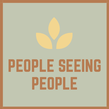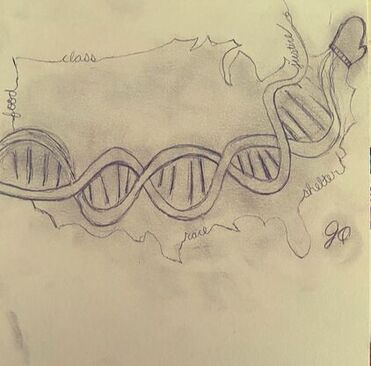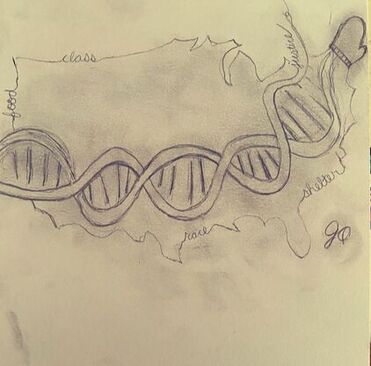I was feeling like my life wasn't having any impact, only on individuals. So I thought if I focused my time on economic injustice it would have more impact. Currently, I work at an elementary school. I was hopeful that my job could be systems work, but it ended up being more transactional. I hand people things they need today. It is incredibly important and very impactful for that child and for that family. I give every student a tour of my office. I say ‘if you know your family needs food, sometimes we all need a helping hand, just talk to your teacher and you can come pick out the food.’ They shop with dignity, they get to choose. Shopping with dignity is really important. Now we call families and ask if they need help. It’s harder with COVID, but I knew of a few families that needed clothing and knew their interests so I went to their backyards, held up clothes, and let them choose what they wanted and that is just the DNA of our country.”
During COVID and school closures, Beth continues her fight for economic justice. “The other thing that I am working on right now is food distribution at Logan High School three days a week, two hours every day. We hand out food that will probably get thrown away otherwise. What I am doing right now is trying to keep food from getting thrown away and giving it to families. We see 200 to 300 people a day, mostly the same families, but some new families too. We do not ask for names, contact information, and there is no application process. If they were to go to another food pantry, they would be asked these questions. We have alleviated that shame that people feel. People begin to feel shame and it goes back to the roots of our nation “pull yourself up by your bootstraps.” If you work hard, you will be successful so therefore if you're not successful it must mean you didn't work hard or something is wrong with you.” Beth recognizes that every child needs guidance and care from a loving adult, and she shared an example of how she supports the students with whom she works. “One project that I implemented has become one of the most rewarding parts of my day. If kids' parents can't afford to bring in a birthday treat, we have cake mixes at school. A teacher can identify a child and that child can come and bake with me. I am trying to teach the child how to read and do math. I also teach kitchen safety, a lot of these children are responsible for cooking for themselves. It’s not just about making the birthday cake. They do everything, they measure everything and then while it is baking they get to pick out a birthday book. Then they frost the cupcakes and carry that plate of cupcakes through the school to their class and give them out. They help wash the dishes afterward and we talk about washing dishes and how to do that. It’s a wonderful experience for that child and one of my favorite parts of my job. It costs like five bucks to do, plus my time and it is such a great investment. It makes their birthday special and everybody deserves to feel special at least one day a year.” With tender moments, there are also trying moments or moments of reality that Beth captured. She told us about what she sees as some of the most pressing concerns at this time for our community members. “I see how easy the problem is to solve, but we allow bureaucracy to stop us from solving it. We have so many empty homes and buildings in this community, yet we have a park full of people experiencing homelessness. Society has its own definition of who the deserving and the undeserving poor are. People say ‘We don’t want to make it too easy for people. We don’t want to give a kid too many backpacks in a year because they are not learning that responsibility of keeping that backpack and taking care of it.’ This is a child. It would be great if they learned the responsibility of taking care of their possessions, but you try living in their home where 18 people are living, coming and going. I am not going to deny a child another backpack when I have a cupboard full of backpacks or another pair of mittens even though I’ve given that child 10 pairs of mittens. I’m not going to deny them a pair of mittens. It’s not that child’s fault. My core is angry, but I keep doing it because it's my job. It's not my economic job, but my job as a human being.” As Beth continues to stay solution oriented, she emphasizes strength in numbers and kindness for all. “People should volunteer. We need more of us to volunteer at the Hunger Task Force. They need help sorting food. Find out where organizations need helpers. If you have the means, support local businesses so they can keep their employees. If you don't have the financial means, donate your time.” Beth’s message is a reminder for us to take a pause and reflect. “Nobody chooses to be poor. Nobody chooses to be unsheltered. It’s just the luck of your life where you happen to be born. It’s the condition of your home, the condition of your drinking water, if there's lead paint in your walls. It’s whether you feel safe and you can get restorative sleep at night. Those all contribute and people need to understand the big picture. It’s so complicated, but the solution is not complicated. Stop standing up for corporations and start standing up for the people. Vote, that's the best thing people can do. You also need to ask yourself, what have you done to make La Crosse safer for everyone?” Artist’s note: The sketch depicts how ingrained system inequalities are within the United States. The mitten shows that everyone deserves to be warm in the winter regardless of their social class. Students should not be denied warmth. The United States is a big place, but we can make it a better place, together.
0 Comments
Leave a Reply. |
|


